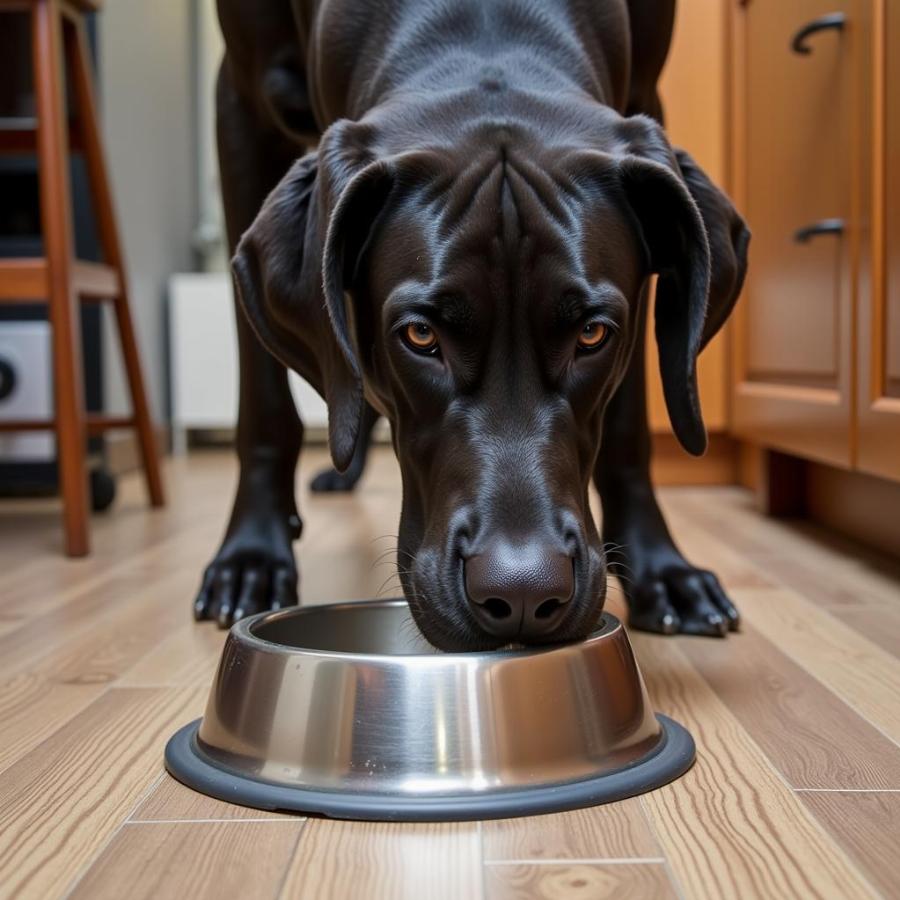The Great Dane, often referred to as the “Apollo of Dogs”, is a breed known for its impressive size and gentle nature. But have you ever come across the term “dane dog lps”? This search term often leads people down a rabbit hole of confusion, mistaking these gentle giants for toys. Let’s clear things up and dive deep into the world of Great Danes, covering everything from their temperament to their specific needs.
Understanding the Search “Dane Dog LPS”
The term “LPS” stands for “Littlest Pet Shop”, a popular line of toy animals. When someone searches for “dane dog lps”, they are likely looking for toys, figurines, or collectibles featuring Great Danes. While this search might not directly relate to live Great Danes, it highlights the breed’s popularity and appeal, even in the toy world.
This guide, however, is dedicated to the real deal: the magnificent, loving, and larger-than-life Great Dane breed. Whether you’re considering welcoming a Great Dane into your family or simply curious about these gentle giants, this comprehensive guide has you covered.
Great Dane Temperament and Personality
Great Danes are known for their calm and affectionate personalities. They are often called “gentle giants” due to their patient and loving nature, especially with children.
- Loyal Companions: Great Danes form strong bonds with their families and love being involved in family activities.
- Playful Personalities: Despite their size, Great Danes enjoy playing and can be surprisingly goofy.
- Alert and Protective: While not inherently aggressive, Great Danes are alert dogs and can be protective of their family and home.
Caring for Your Great Dane
Owning a Great Dane comes with a unique set of responsibilities. Their size and specific needs require careful consideration:
1. Nutritional Needs:
- High-Quality Dog Food: Choose a high-quality dog food formulated for large breeds. Consult with your veterinarian for the appropriate amount to feed based on your Dane’s age, activity level, and metabolism.
- Feeding Schedule: Establish a regular feeding schedule to prevent bloating, a serious health concern for large breed dogs.
- Fresh Water: Always ensure your Dane has access to fresh, clean water.
 Great Dane Eating from a Bowl
Great Dane Eating from a Bowl
2. Exercise and Mental Stimulation:
- Daily Walks: Great Danes need moderate daily exercise. Aim for at least one long walk per day.
- Playtime: Engage your Dane in playtime with toys to provide mental and physical stimulation.
- Training: Early training and socialization are crucial for Great Danes. Enroll in obedience classes to help them become well-mannered companions.
3. Health Considerations:
- Bloat: As mentioned earlier, bloat is a life-threatening condition common in large breeds. Learn the signs and symptoms and seek immediate veterinary care if you suspect bloat.
- Hip Dysplasia: This is a genetic condition affecting the hip joint. Responsible breeders screen their dogs for hip dysplasia.
- Regular Vet Checkups: Schedule regular checkups with your veterinarian to ensure your Dane stays healthy.
Is a Great Dane Right for You?
Before bringing a Great Dane into your life, it’s crucial to ask yourself:
- Do I have enough space? Great Danes require ample space to move around comfortably.
- Can I provide adequate exercise and mental stimulation? Great Danes thrive when they have outlets for their energy.
- Am I financially prepared for the costs? Large breed dogs come with higher costs for food, vet care, and supplies.
Finding a Great Dane
If you’ve determined a Great Dane is the right fit, consider these options:
- Reputable Breeders: Seek out reputable breeders who prioritize the health and temperament of their dogs.
- Rescue Organizations: Consider giving a rescued Great Dane a loving home. Contact local Great Dane rescue organizations.
Conclusion
Great Danes are magnificent dogs with gentle souls. Understanding their needs and temperament is key to providing a loving and supportive home. Remember, while searching for “dane dog lps” might lead you to adorable toys, the real joy comes from sharing your life with a real-life Great Dane companion.
FAQs about Great Danes
1. Are Great Danes good with children?
Yes, Great Danes are known for their patience and gentleness with children, earning them the nickname “gentle giants.” However, supervision is always important with any breed and children.
2. How much exercise does a Great Dane need?
Great Danes need a moderate amount of exercise. Aim for at least one long walk per day, along with playtime and mental stimulation.
3. What health problems are Great Danes prone to?
Great Danes are prone to bloat, hip dysplasia, and certain heart conditions. Regular vet checkups and a healthy lifestyle can help minimize risks.
4. How long do Great Danes live?
The average lifespan of a Great Dane is 8-10 years.
5. Are Great Danes good apartment dogs?
While Great Danes can adapt to apartment living, they thrive in homes with more space. Adequate exercise and mental stimulation are crucial in smaller living spaces.
Looking for More Information?
- Discover more about great dane dog lps and explore the world of Great Dane collectibles.
- Learn about essential supplies like dog bowl food and water options for your Great Dane.
Need more help with your Great Dane? Contact Beaut Dogs at [email protected] for expert advice and support on all things dog-related.
Beaut Dogs is your trusted source for everything about dog breeds. We offer a wealth of information on dog care, nutrition, training, and more. Visit our website today to learn more about giving your furry friend the best possible care.